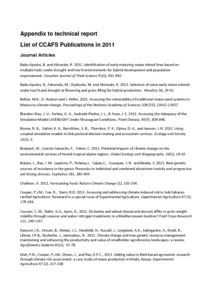This report reflects the summary of baseline findings in Malawi, under the auspices of the Global Framework for Climate Services (GFCS) Adaptation Programme in Africa. It identifies gaps in climate information access and use at the local level, types of climate services farmers and pastoralists need in Malawi, relevant channels to reach farmers with requested services, lead-time and gender-specific requirements for the design and delivery of climate services that matter to farmers.
Search results
Showing items 1 through 9 of 292.-
Library ResourceReports & ResearchJuly, 2015Malawi, Africa, Sub-Saharan Africa, Eastern Africa
-
Library ResourceDecember, 2012
CCAFS got off to a strong start in 2011, releasing high?profile scientific results and helping achieve, in collaboration with multiple partners, a significant outcome in the global climate change negotiations. The full set of reports from Centers, Themes and Regions on which this CRP synthesis report is based are available here.
-
Library ResourcePolicy Papers & BriefsApril, 2016
Taking a gender-responsive approach to Climate-Smart Agriculture (CSA) means that the particular needs, priorities, and realities of men and women are recognized and adequately addressed in the design and application of CSA so that both men and women can equally benefit.
The gender gap in agriculture affects how men and women access and benefit from CSA.
A gender-responsive approach to CSA addresses this gap by recognizing the specific needs and capabilities of women and men.
-
Library ResourceJournal Articles & BooksDecember, 2016
In countries with transitional economies such as those found in South Asia, large-scale irrigation systems (LSIS) with a history of public ownership account for about 115 million ha (Mha) or approximately 45% of their total area under irrigation. In terms of the global area of irrigation (320 Mha) for all countries, LSIS are estimated at 130 Mha or 40% of irrigated land. These systems can potentially deliver significant local, regional and global benefits in terms of food, water and energy security, employment, economic growth and ecosystem services.
-
Library ResourceReports & ResearchDecember, 2012
This study systematically reviewed the literature to evaluate how suitable existing farm and farm
-
Library ResourceOctober, 2013Haiti, Central America, South America
CIAT - International Center for Tropical Agriculture. Achieving Sustainable Agricultural Production in Haiti. In collaboration with international and local partners to assist with Haiti’s severe food production constraints in three major areas:
Seed Solutions for Food Security
Improved seeds of staple crops are a major leverage point for change in agriculture. By giving higher and more stable yields, they offer short-term benefits, which open the way toward a more profound transformation.
Resilient System Solutions for Sustainable Growth
-
Library ResourceReports & ResearchDecember, 2014
Because vulnerability is a conceptual construct rather than a directly observable phenomenon,
most vulnerability assessments measure a set of “vulnerability indicators”. In order to identify
the core approaches and range of variation in the field, we conducted a systematic literature
review on local vulnerability to climate change. The systematic review entailed an
identification of frameworks, concepts, and operationalizations and a transparency assessment
of their reporting. Three fully defined relevant frameworks of vulnerability were identified:
-
Library ResourceJournal Articles & BooksDecember, 2015Africa, Sub-Saharan Africa
Rhamphicarpa fistulosa is a facultative hemi-parasitic plant of the Orobanchaceae family, adapted to wet soils. Apart from tropical Australia, it is only found in sub-Saharan Africa, where it is considered a minor weed in cereal crops such as rice. Due to this status, the species has received only sporadic attention. Recent field observations and encounters with rice farmers in several African countries showed that R. fistulosa is, however, a more serious and increasing production constraint than previously thought.
-
Library ResourcePolicy Papers & BriefsNovember, 2016Honduras, Central America, South America
The agricultural development project ACCESO
reduced greenhouse gas emissions (GHG) and
led to net carbon sequestration due to perennial
crop expansion.
? Increased fertilizer use was a moderate source
of emissions that was more than offset by
reduced emissions from other ACCESOsupported
practices, including improvements in
soil, water, and fertilizer management, and in
feed and grassland use by dairy cows.
? Compared to conventional practices, ACCESOsupported
activities reduced emission intensity
-
Library ResourceReports & ResearchFebruary, 2016
This working paper synthesizes knowledge within CGIAR on adaptation measures in agricultural systems, for the benefit of parties and observers preparing submissions to the UNFCCC SBSTA. Experience from CGIAR and partners indicate that adaptation measures covering policy, technological, financial, institutional, and research interventions are being tested and applied in agricultural systems in low-income and middle-income countries.
Land Library Search
Through our robust search engine, you can search for any item of the over 64,800 highly curated resources in the Land Library.
If you would like to find an overview of what is possible, feel free to peruse the Search Guide.









